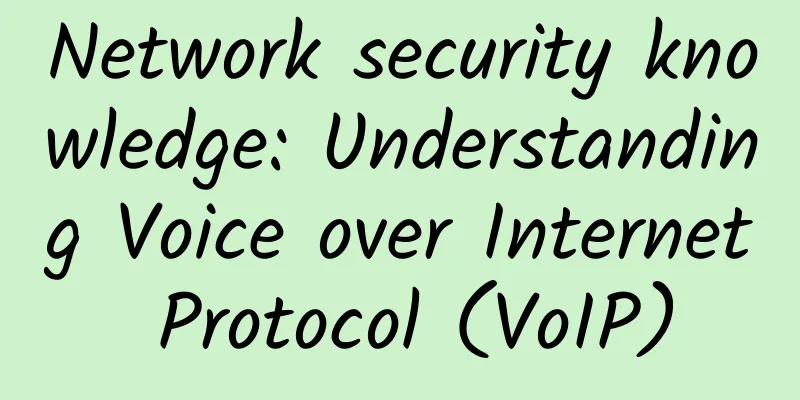Network security knowledge: Understanding Voice over Internet Protocol (VoIP)

What is Voice over Internet Protocol (VoIP)?Voice over Internet Protocol (VoIP), also known as IP telephony, allows us to make phone calls using an Internet connection. Instead of relying on analog lines like traditional telephony, VoIP uses digital technology and requires a high-speed broadband connection, such as DSL or cable. There are various providers that offer VoIP, with different services. The most common application of VoIP for personal or home use is an Internet-based phone service that relies on a telephone exchange. With this application, you still have a phone number, you can still dial a phone number, and you usually have an adapter that allows you to use a normal phone, and the person being called may not notice the difference from a traditional phone. What are the security risks of VoIP?Because VoIP relies on an Internet connection, it can be susceptible to many of the same problems that computers face, and even some that are specific to VoIP technology. Attackers can perform activities such as intercepting communications, eavesdropping, taking control of our phones, making fraudulent calls from our accounts, conducting effective phishing attacks by manipulating caller ID, and causing service crashes. Activities that consume a lot of network resources, such as large file downloads, online gaming, and streaming multimedia, can affect VoIP service quality. There are also inherent problems with routing phone calls over a broadband connection. Unlike traditional phone lines that survive power outages, VoIP may not work if we lose power. VoIP services may also cause problems for systems that rely on location, such as home security systems or emergency phone numbers. picture How to protect yourself? Keep software up to date - If the vendor releases an update to the software that operates your device, install the update as soon as possible. Installing updates will prevent attackers from exploiting known issues or vulnerabilities. Use and maintain antivirus software - Antivirus software can identify and protect your computer from most known viruses. However, attackers are constantly writing new viruses, so it is important to keep your antivirus software up to date. Take advantage of security options - Some service providers may offer encryption as one of their services. If you are concerned about privacy and confidentiality, you need to consider this option and other available options. Install or enable a firewall - A firewall may be able to prevent certain types of infections by blocking malicious traffic before it enters your computer. Some operating systems actually include a firewall that you'll want to make sure is enabled. Evaluate security settings - Both computers and VoIP devices/software offer a wide range of features that can be customized to suit your needs and requirements. However, enabling certain features may make you more vulnerable, so disable all unnecessary features. Review the settings, especially the security settings, and select the option that meets our needs and does not increase the risk. Reference source: US CISA official website By: Mindy McDowell |
<<: Where is the future of 5G private networks?
>>: Deny 5G and believe in Starlink? IQ is a good thing
Recommend
How many meters can a network cable transmit at most? Several common classifications of network cables
Maximum distance of data transmission via network...
OSI seven-layer and TCP five-layer protocols, why TCP/IP protocol wins
[[278277]] 1. OSI Reference Model 1. Origin of OS...
What is Wi-Fi 6, and how does it help expand broadband access?
The coronavirus pandemic has exacerbated the digi...
Ruishu's next-generation WAF - WAAP platform, a one-stop dynamic active defense covering Web, APP, cloud and API
There is no doubt that traditional WAF is losing ...
Highlights | Speech content of the 39th GTI seminar (1/2)
On February 24-25, the 39th GTI seminar was held ...
ROOBO CTO Lei Yu: Artificial intelligence will not take the big and comprehensive route, vertical fields will blossom first
[Original article from 51CTO.com] Not long ago, a...
ShockHosting 50% off all VPS, 2G memory package starts at $5/month, optional large hard drive
ShockHosting is a foreign hosting company founded...
The convergence of edge data centers and 5G revolutionizes data transmission and the Internet of Things
With the rapid development of the digital age, th...
AlphaVPS: €3.5/month-2GB/15G SSD/1TB/5 data centers including Los Angeles and New York
AlphaVPS is a Bulgarian hosting company, founded ...
Operators' operating data in August: 5G package users approach 600 million, with China Mobile accounting for half of the total
[[425786]] Recently, the three major telecom oper...
Operators and Internet companies jointly promote customized SIM cards, not just a price war
In the competition among the three major telecom ...
What is the principle of communication? It turns out to be so simple
What is Communication? Simply put, communication ...
Embedded CAN Bus Introduction (Low-Level Details)
[[377418]] 1. Introduction CAN bus was developed ...
Three-minute review! A quick overview of 5G industry development trends in September 2021
After the rapid development in 2020, 2021 is a cr...
The Importance of Layered Security in Edge Computing
In this article, we will introduce the role of in...









